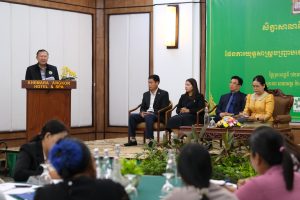24 April 2025, Siem Reap province – Under the ICRC project, the DPA Partnership Programme Coordinator, Project Coordinator, ICRC Communication and Engagement Officer, and CEPA Community Development Facilitator participated in a very important workshop organized by the Gender Mainstreaming Action Group of the Ministry of Environment. The workshop aimed to review the Gender Mainstreaming Strategic Plan (GMSP 2021-2025) and contribute to the development of the new GMSP (2026-2030).
This special event was honored by the presence of H.E. Ngin Lina, Secretary of State and Chair of the Gender Mainstreaming Working Group of the Ministry of Environment. It was also attended by Heads of Provincial Departments of Environment, development partners, environmental officers from all 25 cities and provinces, youth groups, community members, and other relevant guests and stakeholders, with a total of 97 participants, including 42 women. The consultation workshop aimed to gather inputs on key strengths, challenges, and lessons learned from the implementation of the GMSP (2021-2025), and to develop a new strategic plan (2026-2030) that ensures women’s empowerment in the environmental sector, particularly in addressing climate change, making the new plan more effective, comprehensive, and inclusive at all levels.
This workshop is also a crucial step in integrating gender and GEDSI into the preparation of Cambodia’s NDC 3.0 in 2025. Mr. Kuy Sophal, DPA Partnership Programme Coordinator and representative of the ICRC project, took this opportunity to express his gratitude to the Ministry of Environment for allowing Caritas Australia, CEPA, and DPA to take part in this important workshop, promoting gender and GEDSI empowerment in climate actions.
Additionally, Mr. Kuy informed the participants about the ongoing efforts of CA, CEPA, and DPA to improve climate resilience among the most vulnerable households and communities — including Agricultural Communities (AC), Community Fisheries (CFi), smallholder farmers (especially female-led households), people with disabilities, Indigenous Peoples (IPs), LGBTQI+ groups, and other vulnerable populations in villages across Ratanakiri and Stung Treng provinces.



















